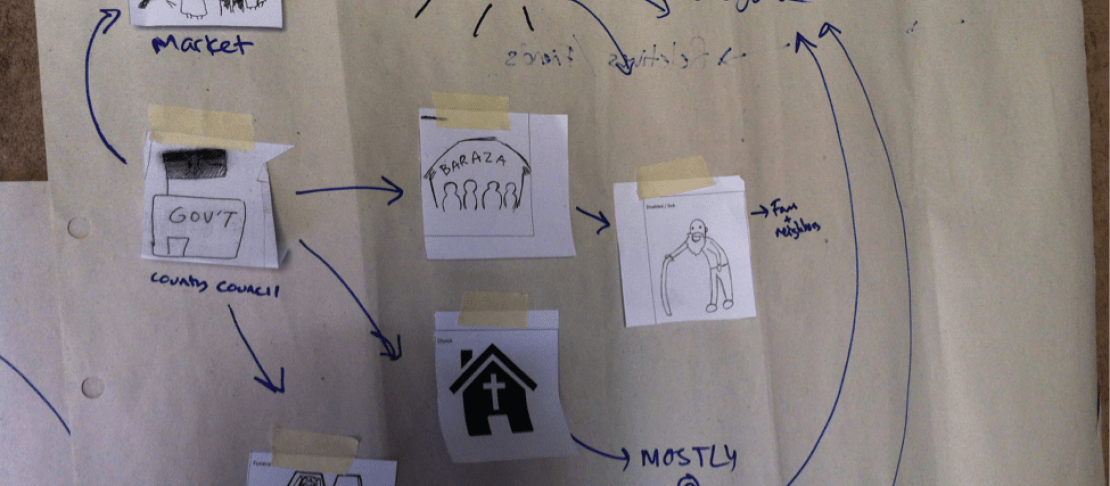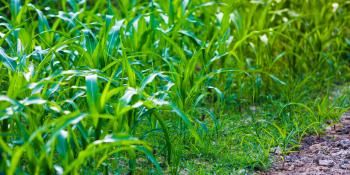Creating participatory gender and climate change research tools together

We are experimenting with co-production of participatory gender and climate change research tools by using collaborative processes for developing a manual that organizations can use to design gender and climate-smart programs.
For planners and researchers alike, participation and co-production have always been attractive approaches. In CCAFS we are using the concepts to revise the design of our participatory research manual on gender and climate change.
While there are many typologies of participation and co-production, the recent aim of CCAFS theme Linking Knowledge to Action was to engage male and female smallholder farmers, NGO field workers, climate scientists and research partners in collaboratively producing research instruments on climate information services. The process of engaging these diverse stakeholders has in itself been a learning experience on how to build capacity and share knowledge. This is how some of it unfolded.
Crowdsourcing Scientists and Partners
CCAFS began the process by “crowd sourcing” among research partners and the CG network of experts for a list of research priorities, gaps and tools in gender and climate information research.
The agenda set forth by these scientists helped frame the information demands of the research community as well as highlighted gender specific priorities. For example, qualitative researchers highlighted the importance of understanding indigenous knowledge systems and locally defined concepts of weather, climate, probability and forecasting. ICRAF scientists also pointed out the importance of instruments that were able to capture the different information demands of men compared to women and how the preference for information is gender-specific.
An initial set of participatory and gender sensitive tools were proposed based on these crowd sourced objectives and fed into a second loop to incorporate community perspectives.
Workshoping with Field Staff
CCAFS then went to coordinate a co-designing workshop in Kisumu, Kenya that included a diverse range of participants such as students from Kenya’s Maseno University, technicians from ICRAF Kisumu, field assistants who were farmers themselves, and rural development workers from partner NGOs such as World Neighbors.
This week long workshop on co-design was at once a capacity building effort to equip ICRAF staff and partners with skills in participatory approaches and qualitative research as well as expanding the Climate Information Services tools to be more inclusive of NGO and farmer perspectives.
The week consisted of gender sensitization and climate change workshops, review of the preliminary research instruments, roleplaying of each activity to improve qualitative approaches, and an iterative process of revision based on the collective experiences and insights of the workshop participants.
Four qualitative tools were produced during the workshop ranging from art-based interpretive games on weather symbols, focus group discussion guides on assessing local concepts of probability, weather and climate, to mapping tools to assess gendered information flow.
Pretesting with Farmers
A key feature of the workshop included three days of pretesting with farmers in peri-urban Kisumu. The workshop team had the chance to evaluate their collaboratively designed research tools with men’s, women’s and youth groups. Every pretest day was followed by an evaluation session in the afternoon where participants revised the tools according to farmer feedback, observations, and pretest experiences.
The pre-testing phase was an essential link between the workshop participants and small-holder communities, linking the practical application of the instruments with the real day to day experiences of farmers.
“Researchers need to work hand in hand with communities on understanding existing indigenous knowledge used for forecasting. Insight on local interpretations of weather and climate can reflect community knowledge systems and support scientific research.”- Joash Mango, ICRAF Kisumu
Expert Review
Currently, the tools are being re-circulated to CCAFS partner organizations such as IFAD, CARE, university partners and different science domains within the CGIAR consortium. We hope that this round of revisions can tap a collective of experts to produce a stronger module for exploring climate information services from a gender perspective. This multi-level process has allowed us to access different segments of the research cycle for feedback that will ultimately help CCAFS produce a flexible, multi-user research instrument.
Moving Forward
This iterative process of testing, learning and revising has been an experiment in social learning and collaborative research design. Field testing of the climate information module is currently underway in CCAFS Western Kenya site in Lower Nyando.
The testing of the module will produce new insights on how the tools can be improved. Ultimately, this process of co-design is a means of achieving long-term sustainability and success for partners implementing gender-transformative climate change programming around the world. More linkages to farmers and deeper interaction between designers at multiple levels are not without challenges, but the process is a valuable lesson in how to produce stronger methodological steps in participatory design.
Nafisa Ferdous, CCAFS Gender and Social Learning Consultant, Joash Mango, ICRAF Kisumu Research Assistant and Christine Jost, CCAFS Linking Knowledge with Action Science Officer



